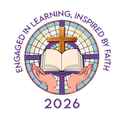Literacy & Mathematics

Mathematics
The Phoenix Maths Club and Phoenix JNR Maths Club, are weekly extension programs offered at St Joseph’s, designed to challenge and develop students’ problem-solving skills in Mathematics.
Through these programs, students engage in rich mathematical thinking and prepare for national competitions, including the Maths Olympiad Challenge and the Maths Explorer Competition.
Selection for the Phoenix Maths Club and Phoenix JNR Maths Club is based on a rigorous process that triangulates multiple data sources, ensuring that students who demonstrate strong mathematical ability and problem-solving skills have the opportunity to extend their learning.
We are pleased to congratulate the following students for being selected for this year’s Phoenix Maths Club and Phoenix JNR Maths Club:
| Year 2 | Year 3 | Year 4 | Year 5 | Year 6 |
Jordan G Ayden J Summer P | Cassius J Robin O Daniel T Ayrah M Krisshia B Falak A Ethan T Isa K Shanuli V Isaac G Luke Q Arya R Gracie C | Austeena A Dehain B Jason T Yuvaan A Antony G Serette K | Rongon D Jordan G Lana M Shaanuja R Patrick S Derrick G Susie Y | Jo-jo G Aadhya S Cathal M Akaysha M Elizabeth T Cristian A Angelin Q Audrey C |
These students are working hard to continue tol develop their mathematical thinking, and we wish them the best of luck as they represent our school in the upcoming Maths Olympiad Challenges and Maths Explorer Competitions.
We look forward to celebrating their efforts and achievements!
English - Writing
One of the most fundamental responsibilities of schools is teaching students to read and write. Reading and writing are foundational literacy skills, and foundational to all other learning areas. Implementing evidence-based instructional practices enhances students’ writing skills and confidence while fostering a deeper understanding, enjoyment of, and appreciation for the writing process.
MACS - Vision for Instruction
At St Joseph’s we are committed to the following:
Create supportive writing environments
- Establish writing instruction as a priority across all learning areas and year levels.
- Create motivating and supporting writing environments where writing is explicitly taught and valued.
- Ensure students write frequently for a range of meaningful audiences and purposes. Integrate instruction across the curriculum, recognising the reciprocity of reading and writing to support learning.
- Provide additional scaffolding and instruction for students with learning difficulties and additional needs.
Develop essential writing skills
- Explicitly teach handwriting and keyboarding skills and give students opportunities to compose using digital and handwriting tools.
- Prioritise explicit instruction in spelling and orthography (encompassing morphology, etymology and phonology).
- Utilise explicit word, sentence, and paragraph analysis to enhance student writing. Embed grammar and punctuation instruction in meaningful tasks.
- Ensure adequate instruction in planning, drafting, evaluating and revision of writing, and embed formative assessment to provide explicit feedback to progress students.
Build knowledge for writing
- Explicitly teach genre macrostructure and microstructure through modelling, guided practice and exemplars, providing subject-specific instruction as required.
- Build knowledge that includes rich content knowledge and language for expressing and developing ideas, such as knowledge of linguistic and rhetorical features, and opportunities to build and extend vocabulary.
